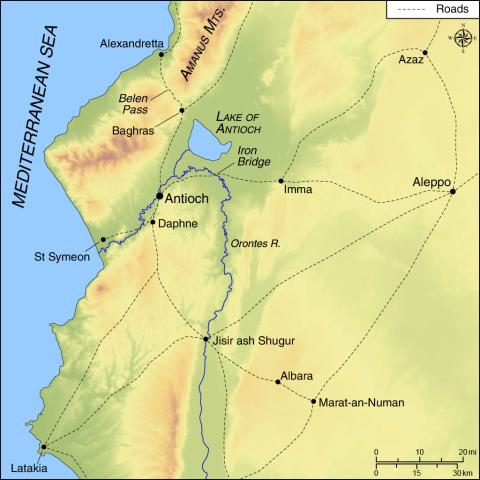Kerbogah Tries to Retake Antioch
[9.21.6] Mox convocāvit suum notārium, et ait: “Scrībe citō plūrēs cartās quae in Chorosāniā sint legendae, vidēlicet: Caliphae nostrō apostolicō, ac nostrī rēgī dominō Soldānō mīlitī fortissimō, atque omnibus prūdentissimīs Chorosāniae mīlitibus, salūs et immēnsus honor. Satis sint laetī et gāvīsī iōcundā concordiā, et satisfaciant ventribus; imperent et sermōcinent per ūniversam regiōnem illam, ut omnīnō dent sēsē ad petulantiam et luxuriam, multōsque fīliōs patrāre congaudeant, quī contrā Chrīstiānōs fortiter pugnāre praevaleant; et libenter suscipiant haec tria arma, quae ōlim abstulimus ā Francōrum turmā, et discant modo quae arma attulērunt super nōs gēns Francigēna.
Adhūc quoque sciant omnēs quoniam ego cūnctōs Francōs intus in Antiochīā conclūsōs habeō, et castrum in meā līberā teneō voluntāte, illī vērō deorsum sunt in cīvitāte. Habeō etiam omnēs illōs iam in meā manū, eōsque faciam aut capitālem subīre sententiam, aut dēducī in Corrozānam in captīvitātem nimiam, eō quod minantur nōs suīs armīs prōpulsāre et expellere ab omnibus fīnibus nostrīs; ceu ēiēcērunt omnēs parentēs nostrōs ā Romāniā sīve Syriā. Āmodo iūrō vōbīs per Machomet et per omnia deōrum nōmina, quoniam ante vestram nōn erō reditūrus praesentiam, dōnec rēgālem urbem Antiochīam et omnem Syriam sīve Romāniam atque Bulgāriam usque in Āpūliam acquīsierō meā fortī dexterā, ad deōrum honōrem et vestrum, et omnium quī sunt ex genere Turcōrum.” Sīc fēcit fīnem dictīs.
notes
vocabulary
notārius –iī, m: scribe
carta –ae, f: letter
vidēlicet: namely
soldānus –ī, m.: sultan (ML)
sermōcinor (1): to chat, converse (CL), tell, proclaim (ML)
petulantia –ae, f: wantonness, sexual indulgence
luxuria –ae, f.: indulgence, extravagance (CL); lust (ML)
patrō (1): to accomplish (CL); to produce (ML)
turma –ae, f: cavalry squadron
deorsum: down below (OLD 2)
finis finis, m.: boundary; (in plural) territory
ceu: in the same way as, like (OLD 1)
āmodo: henceforth
Machomet: Mohammed
acquīrō acquīrere acquīsī(v)ī acquīsītum: to acquire

